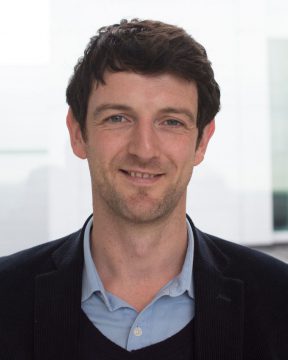There are many papers and grants that have published on things that never get put into practice, and that’s because the end-user is not involved in the identification or design of what the need is."
- Stephen Bartels, MD, MS
One afternoon several months ago, Dartmouth researcher Sarah Pratt received a phone call she didn’t expect. Brian Collins, who heads up a behavioral health and developmental services organization in Strafford County in New Hampshire, had a proposal he wanted to discuss with her.
Collins had previously been part of a statewide research effort that Pratt and her colleagues at Dartmouth’s Health Promotion Research Center had helped lead. It showed that offering wellness incentives, such as memberships to gyms and Weight Watchers to people with severe mental illness could significantly reduce their high risk of developing cardiovascular disease—a major reason why they die on average about 25 years earlier than the rest of the population.
“I wondered if an adaptation of that program could achieve similar results for my clients with developmental disabilities (DD), who also suffer from high rates of heart disease and premature death,” says Collins, executive director of Community Partners NH.
Their interaction was quite different from the norm. “Usually, a researcher approaches the community with a study proposal and essentially gets them to sign off on it,” explains Pratt, PhD, an assistant professor of psychiatry at the Geisel School of Medicine and of The Dartmouth Institute for Health Policy and Clinical Research. “Here was someone with expertise in providing vital services in the community reaching out to us. Not only was he identifying a real need, he wanted to partner with us in a research effort.”
Community Engagement Research Pilot Awards

Collins’ timing couldn’t have been better. A new funding mechanism, offered by SYNERGY, Dartmouth’s Clinical and Translational Science Institute, had become available in the form of pilot awards in early 2016, and was specifically designed to support this kind of effort.
“The main goal with our pilot funding is to support community engagement research that emphasizes the community’s role in developing and translating knowledge into improvements in clinical practice, community programs, or social determinants that impact health or health policy,” explains Stephen Bartels, MD, MS, who co-directs SYNERGY’s Community Engagement Research Core.
“The strong involvement we’ve had from community members throughout the whole process—from pilot design, to requiring that researchers have a community partner engaged in their work in order to qualify for funding, to reviewing the pilot applications—gives us a unique opportunity to better understand our communities’ needs and how we can help them meet those needs,” says Sally Kraft, MD, MPH, who co-directs the Core with Bartels.
After announcing they would award three $50,000 one-year pilot awards and issuing a call for proposals, the Core received 17 letters of intent, of which 10 were invited to submit full applications. Three of these projects received Community Engagement Research Awards for 2016 (running from July 1, 2016 to June 30, 2017)—based largely on their ability to address issues that have been identified by published community health needs assessments, and provide data for future externally funded, full-scale studies.
Testing Fitness Promotion with People with Developmental Disabilities
Awarded to and co-led by Pratt and Collins, and in collaboration with the University of New Hampshire Institute on Disability, the first project “is determining whether the adapted program helps obese and sedentary people with developmental disabilities to become more fit, and whether this is a model that can be used by other area agencies in New Hampshire and across the country,” says Pratt.

Importantly, trained staff members on the project are providing the adapted program, which includes education on healthy eating and exercise, to both clients and their support teams. “The support teams are a critical piece in this,” explains Collins, “since many people with developmental disabilities aren’t able to, for example, prepare their own meals or drive themselves to a gym and work out.”
“We’re very excited to have this opportunity,” he adds. “We hope this intervention not only shows the potential for improving our clients’ health, but that it can help increase their self-confidence and their sense of belonging to their communities.”
Enhancing Well-being, Access to Services for People with Mental Illness
A second pilot award project, being co-led by Elizabeth Carpenter-Song, PhD, a research assistant professor of anthropology at Dartmouth College and at The Dartmouth Institute, and Sara Kobylenski, MSW, executive director of the Upper Valley Haven, seeks to develop some key recommendations and strategies that can be used to improve mental health in the region.
“Most people struggling with mental health and substance use issues are not receiving treatment, and low-income rural individuals are particularly vulnerable as both rural poverty and mental health disparities are deepening,” explains Carpenter-Song.
Our project aims to place the voices and experiences of people who live ‘at the margins’ at the center of designing truly patient-and-family-centered mental health services."
- Elizabeth Carpenter-Song, PhD
“Our project aims to place the voices and experiences of people who live ‘at the margins’ at the center of designing truly patient-and-family-centered mental health services,” adds Carpenter-Song, who is utilizing ethnographic interviewing and multimedia storytelling techniques in the effort.
“We’re so pleased to have received this pilot award with Elizabeth because of the potential impact this work can have in the region,” says Kobylenski. “At the Haven, we serve in total about 13,500 people per year who are struggling with poverty by providing food, shelter, education, clothing, and support services at no charge.”
Members of the Haven community are involved in all aspects of the project, she says, from serving as Advisory Board members, to participating in interviews and group discussions, to helping to interpret findings and eventually sharing key lessons learned with research, social services, and clinical communities.
“We need many different approaches to research to help solve the difficult health problems that confront individuals and families in our communities,” says Kobylenski. “What SYNERGY is bringing is an opportunity to gain knowledge in a way that hasn’t been available before.”
Enhancing Shared Decision Making for Individuals with Depression
“I saw involvement in this project as an opportunity to hopefully make some good out of the experiences that we’ve had,” says Jim Matthews, who has suffered from depression and also been a caregiver for family members who have struggled with the disease.
Matthews is partnering with Paul Barr, PhD, MSc, an assistant professor of The Dartmouth Institute, on a third SYNERGY pilot award project aimed at developing a digital platform that links routine screening for depression with what’s called an Option Grid decision aid for patients with depression in primary care offices.

"With about 16 million adults in the US having at least one major depressive episode each year, depression has enormous social, financial, and health-related impact,” says Barr. “And we know that individuals with depression are not adequately engaged in treatment decision-making, which negatively impacts their care. We believe that this kind of tool, made available on tablets for patients as they wait to see their physician and seamlessly embedded in clinic workflows, can have real impact.
“The project is informed by previous work we did that led to a paper-based version of the tool, which was well liked and readily accepted when reviewed by clinicians and patients,” adds Barr. In partnership with the Substance Abuse and Mental Health Services Administration, Mental Health America, patients (like Matthews), caregivers and consumers, the new tool is being evaluated in a series of focus groups at Dartmouth-Hitchcock primary care clinics in Nashua, NH.
“I think one of the real strengths of this research approach, in addition to being scientifically sound, is it includes perspectives from patients and family members,” says Matthews. “That’s very encouraging because it seems like an approach that is more likely to deliver meaningful results to the people that it’s supposed to help.”
For more information about SYNERGY’s Community Engagement Research Core, visit: https://synergy.dartmouth.edu/community.